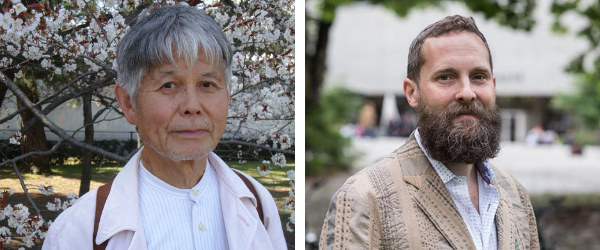Visiting Poet
Visiting Poet: Jeffrey Angles on Mutsuo Takahashi

Four Poems
Navigation by Night
The boat is the symbol of desire—
Fleets of Achaean ruffians off to conquer Troy,
The Argo off to steal the Golden Fleece,
Rogue ships searching for the New World
During my youth, the nightly navigations
Of the bow between my thighs was no exception
Now I am moored to the pier—my small boat rows
Secretly at night toward poems on my desk
As my only guide, I rely upon the unreliable ars poetica
Learned during days adrift on a licentious sea
The Loser’s Excuse
An alternative account of the Odyssey
Why is he the one always in the right? Why must we be the scoundrels?
It was he who stole strapping lads from all over and set them to sail for twenty years
But who in the meantime brought peace and security to this land?
Isn’t it to our credit that we congregated in his manor and raised such a racket?
For over a decade no one occupied the throne, the surrounding countries attacked
The king’s father grew old, his son was useless, so our assault was just a matter of time
Who knew if our lord was dead or alive? Of course, we’d choose a new one in his place—
Shouldn’t he have safely escorted home all the young men he had taken away
Rather than censure us for squandering his fortune with food and drink?
For ten years, his clever wife deceived us, not until she finished weaving a burial shroud
For her father-in-law, she said, but what she wove during the day, she unraveled at night
Meaning that what she wove during those years was, in fact, our funeral shrouds
After twenty years, he returned disguised as a beggar, showed himself to son and servant
And as the archery contest ended, he tricked us, shot us all, slaying us to the last man
If justice exists, I pray your wife and the Lord of Hades will judge us fairly—
Mumbling these things to ourselves, our blood-soaked souls gather and shuffle
Downward into the fog spilling from the underworld’s open maw
The Labyrinth
Knossos
Dug out of the ground, bright beneath the midsummer sun, exposed,
Is the labyrinth. As we enter, we scatter like children in the afternoon,
Taking with us not even a speck of shadow, nothing but our own two feet
The reason we wander, as our bare heads and sheltered armpits drip with sweat,
Lost along the bright paths through the mysteries each one of us has brought
Is so that we may learn there is no darkness or ambiguity here—all is bright and just-so
For that is the true nature of mystery. Once we learn this truth, afterwards,
Everywhere our feet carry us, all roads we tread, will become labyrinths
Even the roads in our own countries leading us to our homes, even the alleyways,
Even our houses, even the likenesses that stare back at us from our own mirrors
Asleep
On this trip, I’ve slept a lot. Of course,
I’ve slept in the hotel at night with windows open
As a gentle breeze played across my sweat-covered brow
Also in the bus during the day, and in the shade of ruins
It’s like my first trip fifty years ago, all over again
What has changed? The sleeper isn’t a young man of thirty
But an old man in his eighties, living his last years
Watching over him isn’t Eros, god of love, but
Thanatos, god of death, wearing Eros’ guise
As I doze off over and over again, I realize
The god of death is much kinder than the god of love
And much more youthful too
Translated from the Japanese by Jeffrey Angles
Jeffrey Angles on Mutsuo Takahashi
In the mid-1960s, the young poet Mutsuo Takahashi, newly arrived in Tokyo, shocked the Japanese literary world with his poetry describing homoerotic desire in unflinching, even electrifying language. This interest in homoeroticism dated back to his youth in the deep rural south of Japan. Born in 1937 into a family of impoverished day-laborers, he lived in his grandmother’s home as the family struggled to survive the hungry, desperate years of World War II and its aftermath. As he describes in his sensuously beautiful memoir Twelve Views from the Distance, he took refuge from the near-constant insecurity produced by war and poverty through affectionate, often erotic exchanges with other boys.
Once in Tokyo, Takahashi quickly began to explore the vast, gay underground of the metropolis, spending his nights cruising bars, bathhouses, and parks. At the same time, he became an avid reader who quickly absorbed not just Japan’s literary heritage, but that of the wider world as well. In particular, he loved Greek literature, which appealed to him partly because of its openness to male love. As he began to write about his own existential and erotic explorations, he frequently drew upon Greek motifs, imagery, and classical language, giving his work an aura of history and erudition, even when handling subjects that many at the time would have considered déclassé or even pornographic.
This work quickly attracted the attention of a network of writers, including the prominent novelist Yukio Mishima, whose own homoerotic Confessions of a Mask served as a landmark in queer literary history. With the encouragement of Mishima and others, Takahashi only grew bolder. Later, as the range of his themes began to expand in the 1970s, he started to win acclaim from the wider reading audience. Meanwhile, he branched out from modern-style, free verse into traditional Japanese verse forms such as haiku, tanka, and renga, thus demonstrating his mastery over a range of genres that is unusual in Japan, where most poets concentrate on only one genre.
To date, Takahashi has published an astonishing forty-eight books of poetry and earned just about every major poetry prize in the nation. In fact, in 2017, the Japanese government named him a Person of Cultural Merit, its highest award for a literary figure. The same year, he was also elected to the prestigious Japan Arts Academy, highlighting just how far he had come from his impoverished, illiterate grandmother’s home in the countryside.
Before his eightieth birthday, Takahashi wrote a dazzling series of poems in which he turns back and looks over his life, revisiting and rethinking many of the themes that had interested him throughout his career. The result was his magnum opus Only Yesterday (Shichōsha, 2018). The book contains 153 poems, most of which are between ten and twenty lines long. Although the poems are short, they are full of wit and wisdom as he explores many of humankind’s greatest concerns: the nature of beauty, the relationship between love and erotic desire, the significance and meaning of art, and the troubles of growing old. At the same time, it also includes many socially engaged poems inspired by contemporary problems, such as environmental destruction, exploitation of populations by unscrupulous leaders, the recent rise of nationalism, repression of dissidents, and even the election of Donald Trump in the United States.
What makes this collection so extraordinary, however, is that even when talking about universal themes or contemporary issues, Takahashi consistently uses motifs and ideas borrowed from ancient Greek culture. In other words, Greece serves as the lens through which Takahashi—a lifelong admirer of classical literature—views the world. Some of the poems are humorous and witty, whereas others (especially those about his memories of his homoerotic youth and the pains of growing old) are profoundly poignant. Some of the poems take the form of aphorisms, little nuggets of wisdom gained from individual experience, while many others employ the types of metaphors, mythology, and logic that Takahashi admired so much in the Socratic dialogues.
The contemporary novelist and poet Hisaki Matsuura has written about Only Yesterday, “The most apt metaphor to describe Takahashi’s poetic production is the performance of a tightrope walker. With great care and indescribable pleasure, he skillfully crosses the taut rope connecting the vulgar and the sacred, poetic form and free verse, as well as Japanese verse and ancient poetry.” Written in a variety of modern Japanese with numerous, old-fashioned, even classical accents, the book is a true example of a world literature, bridging East and West, new and ancient, wit and wonder, all within a clever, moving, and idiosyncratic work that only Takahashi could produce.

Mutsuo Takahashi (高橋睦郎) is one of Japan’s most prominent living poets, having won almost every major poetry prize in the nation. Takahashi has published forty-eight books of poetry and countless volumes of poetry, essays, and literary criticism. Five collections of his poetry are available in English translation: Poems of a Penisist (Chicago Review Press, 1975, reprinted University of Minnesota Press, 2012), A Bunch of Keys (The Crossing Press, 1984), Sleeping, Sinning, Falling (City Lights, 1992), Two Shores (Dedalus, 2006), and We of Zipangu (Arc Publications, 2007). His memoir Twelve Views from the Distance (University of Minnesota Press, 2012), translated by Jeffrey Angles, was shortlisted for a Lambda Literary Award. Takahashi presently lives in the seaside city of Zushi, ten kilometers to the south of Yokohama.
Jeffrey Angles is a poet, translator, and professor of Japanese literature at Western Michigan University. His collection of poetry Watashi no hizukehenkōsen (My International Date Line, 2016), which he wrote in Japanese, won the highly coveted Yomiuri Prize for Literature. In addition, he has published dozens of English translations of Japan’s most important modern authors and poets, earning numerous prizes for his translation work. He believes strongly in the role of translators as activists, and much of his career has focused on the translation into English of socially engaged, feminist, or queer writers.

